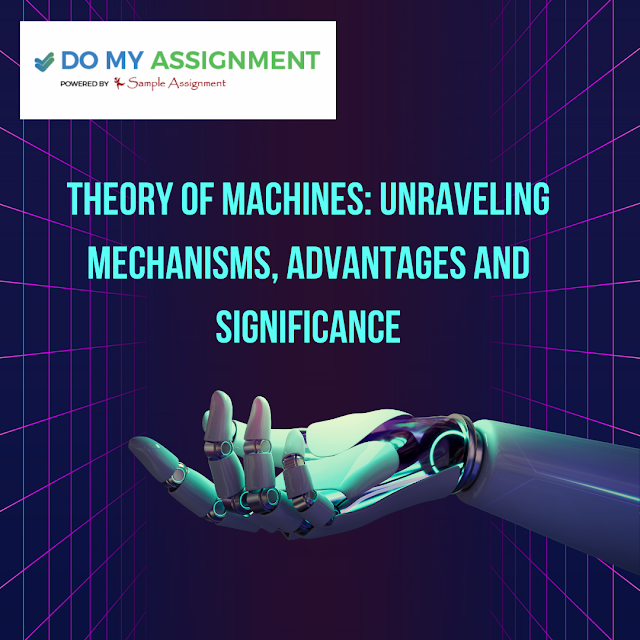Theory of Machines: Unraveling Mechanisms, Advantages and Significance
The Theory of Machines is an enthralling section of mechanical engineering that focuses on comprehending the fundamental principles and mechanics underlying machine motion and operation. Moreover, it goes into the study of linkages, gears, cams, and other mechanical systems that serve as the foundation for a wide range of engineering applications. Furthermore, we delve into the complexities of the Theory of Machines, highlight its benefits, explain its significance in the field of engineering, and investigate the critical role that Do My Assignment services play in supporting the learning process in this detailed investigation.
Understanding the Theory of Machines
The Theory of Machines is a subfield of mechanical engineering that examines the kinematics and dynamics of machines. Moreover, it involves the study of various mechanical components and mechanisms that transmit and transform motion and force. Furthermore, key areas of study within the Theory of Machines include:
Kinematics is the study of the geometric aspects of motion such as displacement, velocity, and acceleration. Moreover, it entails analysing machine component motion without taking into account the forces that create the motion.
Dynamics: Dynamics is concerned with the forces and moments acting on machine components. Furthermore, it encompasses the study of how forces affect machine motion and balance.
Mechanisms: Mechanisms are configurations of rigid structures (links) and joints that allow for controlled motion. Gears, linkages, cams, and belts are examples of common mechanics.
Linkages are groups of links joined together by joints. Moreover, they are essential components of numerous machines and operations, including robots, engines, and manufacturing machinery.
Gears and Gear Trains: Gears and gear trains are toothed wheels that convey motion and power. Gear trains are groups of gears that are used to achieve precise speed and torque ratios.
Followers and Cams: Cams are particularly formed profiles that convert rotating motion into oscillating or linear motion. The components that ride on the cam surface are known as followers.
Balancing: Balancing is required for machinery to run smoothly. It entails ensuring that the spinning components' centers of mass aligned with the axis of rotation.
Vibration Analysis: Vibration analysis is essential for assessing machine dynamics and controlling excessive vibrations that can cause wear and damage.
The Advantages of Studying the Theory of Machines
Studying the Theory of Machines offers numerous advantages, both in terms of engineering knowledge and practical applications. Below, we explore the key benefits of delving into this dynamic field: Mechanical Understanding: The Theory of Machines provides a deep understanding of mechanical systems, allowing engineers to design, analyze, and troubleshoot machinery effectively. Problem-Solving Skills: Engineers specializing in the Theory of Machines develop strong problem-solving skills by addressing complex challenges related to motion, forces, and mechanical design. Design and Innovation: The field promotes innovation by allowing engineers to build new mechanisms and optimise current ones for enhanced performance. Versatile Engineering Knowledge: Graduates obtain adaptable engineering expertise that can be used in a variety of engineering areas, including robotics, automotive engineering, aerospace, and manufacturing. Automation and Robotics: Understanding mechanics and kinematics is necessary for building automated systems and robotics, which contribute to developments in industry and healthcare. Safety and Reliability: Understanding machine dynamics and mechanisms is critical for assuring mechanical system safety and dependability, preventing accidents and malfunctions. Efficiency and energy conservation: Engineers who understand the Theory of Machines can optimise machine designs for energy efficiency, lowering operational costs and environmental effects.
The Significance of Learning the Theory of Machines
The Theory of Machines holds significant significance in various industries and aspects of modern engineering:
Machine Design:
Understanding the theory of machines is crucial for designing machines with optimal performance, efficiency, and safety.
Manufacturing:
In manufacturing, the theory of machines is applied to the design and operation of machinery, improving production processes and quality.
Automotive Engineering:
Automotive engineers rely on machine theory to design engines, transmissions, and drivetrains for vehicles, enhancing performance and fuel efficiency.
Robotics:
Robotics engineers use machine theory to design robots and automation systems for industries like healthcare, logistics, and manufacturing.
Aerospace Engineering:
Aerospace engineers apply machine theory to design aircraft and spacecraft, ensuring their safe and efficient operation.
The Role of Do My Assignment Services in Learning the Theory of Machines
Studying the Theory of Machines can be challenging due to its technical nature, complex mathematical concepts, and the need for practical applications. "Do My Assignment for Me" services play a vital role in supporting students as they navigate these challenges and enhance their learning experiences. Clarity of Concept: Kinematics, dynamics, and machine design are all sophisticated ideas in the Theory of Machines. Assignment assistance services give students concise explanations, visual aids, and practical examples to help them understand these complex ideas. Understanding machine theory frequently necessitates practical applications, such as developing mechanisms or analyzing machine behavior. Assignment help services provide students with hands-on tasks and projects that allow them to apply their knowledge in real-world circumstances. Problem Solving: Technical challenges in machine theory can be complex. Assignment assistance services provide students with step-by-step solutions, problem-solving tactics, and coaching to help them complete difficult assignments and projects.
Conclusion
The Theory of Machines is an enthralling section of mechanical engineering that focuses on comprehending the fundamental principles and mechanics underlying machine motion and operation. It goes into the study of linkages, gears, cams, and other mechanical systems that serve as the foundation for a wide range of engineering applications. Furthermore, we delve into the complexities of the Theory of Machines, highlight its benefits, explain its significance in the field of engineering, and investigate the critical role that Do My Assignment services play in supporting the learning process in this detailed investigation.

.png)

.png)
Comments
Post a Comment